From the Rock of Gibraltar, to Rock Bottom in Bielefeld, to the Olympiastadion in Berlin: My Football Fan Origin Story
How a lad born on the edge of Europe fell in love with a club no one else wanted.
Every football fan has their origin story.
How they ended up with the club that now ruins their weekends.
For some, it’s a hand-me-down. Like bad teeth or that old winter coat. Passed down from parent to child, whether the child likes it or not. For others, it’s geography – you support the local team because, well, what else are you going to do on a Sunday afternoon.
Sometimes, it’s one moment. A thunderbolt goal. A last-minute winner. That one magical player. The first time you watched a game and thought: yes, that’s the kind of misery I want in my life.
Other times, it’s not so much a spark as it is a slow-burning car crash. A little bit of everything. A series of events that gradually snowball into a lifetime of emotional instability.
Take me, for example. I wasn’t born to be a DSC Arminia Bielefeld fan. But here we are.
Every fan has their origin story. Here is mine.
Two memorable things happened in 1981. Arminia Bielefeld’s Ewald Lienen got his thigh sliced open like a Sunday roast. And I was born in Gibraltar. Somehow, a decade and a bit later, I ended up in a codependency with Ewald Lienen’s employer.
My family had no connection to Bielefeld. None. My dad’s from London – half British, half French. My mum is from Fürth, Bavaria. What they were doing in Gibraltar in the late 70s is anyone’s guess, but that’s where they ended up. And where I happened.
At the time, the border between Gibraltar and Spain was closed. Spain wasn’t thrilled that this rocky outcrop stubbornly insisted on being British, so they threw a geopolitical tantrum and shut the border. That’ll teach 'em.
It’s a fifteen-minute stroll from Gibraltar town centre to Spain – unless, of course, the border’s closed. Then it becomes a ferry to Morocco, a lot of waiting around, another ferry back to Spain, and a healthy loathing for international politics. Not ideal, thought my parents. Especially with a baby. Plus, my dad needed a job.
So off we went, drifting through early 80s Europe:
Spain, France, eventually Fürth, where my mum still had friends and family.
By sheer dumb luck, I didn’t end up a Greuther Fürth or FC Nürnberg fan. My dad didn’t find work in Fürth, but a friend of a friend of a friend had a job going in a town called Bielefeld.
The end.
Only, it wasn’t.
I wasn’t anywhere near being an Arminia fan. I was four. My dad wasn’t into football (he came around). We didn’t have a TV. My early football education came from classmates, sticker albums and trading cards. And nobody my age was into Arminia at that time. Not at six years old, not at 8, 9 or 10.
Like every kid, my club loyalties were about as stable as a Windows 95 machine. I swapped teams weekly – though I’m proud to say I never once liked Bayern. Early 90s, I flirted with Leverkusen (Ulf Kirsten’s fault). Then Dortmund in ’92 (for the kit and Chapuisat).
In ’93, a brief fling with Eintracht Frankfurt – mostly due to Yeboah, Okocha, and Gaudino. And the Tetra-Pak shirt, obviously. No TV meant I only knew the Bundesliga – the football equivalent of only knowing the Beatles and thinking you’ve got range.
Meanwhile, Arminia weren’t even on the radar. The 80s and early 90s had not been kind. Relegated from Bundesliga in ’85. Relegated again in ’88, this time to the Oberliga – third tier back then. That’s where they were in ’93/94, when they finally entered my field of vision.
It happened by accident. A newspaper was open on the kitchen counter. A photo caught my eye – a bunch of lads kicking the absolute crap out of each other. Apparently, Arminia had played Preußen Münster and the fans had kicked off. The usual 80s and 90s hooligan scuffle. Something stirred. Local pride. Mild outrage. Who the hell were these Münster clowns?
That was the moment.
That was it. I decided then and there: I support Arminia Bielefeld. Screw Münster.
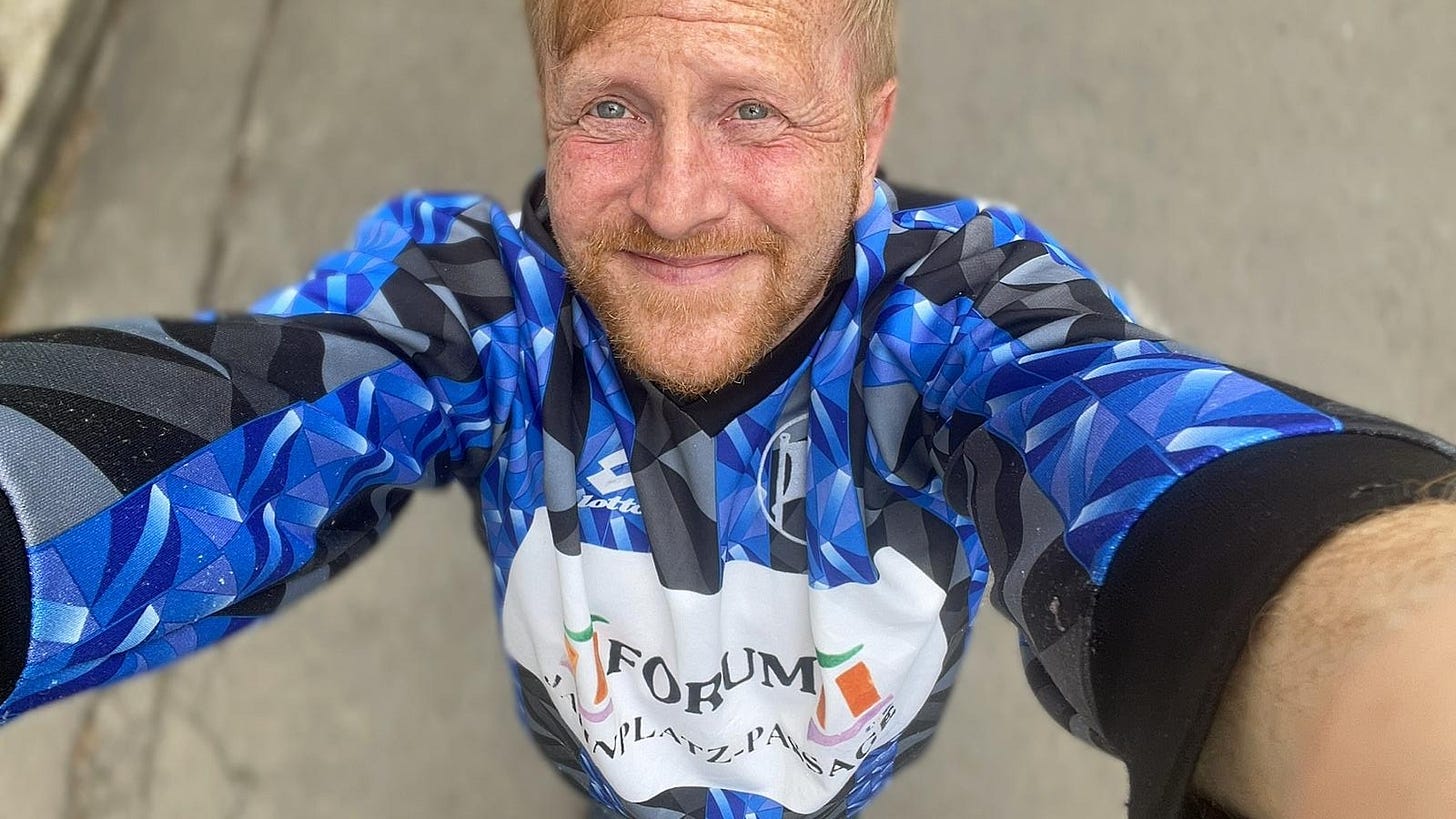
My first full season as a fan? Burned into my memory, thanks to one man: Dr. Uli Zwetz, presenter at Radio Bielefeld. An absolute legend. The voice of Arminia.1
Arminia had just been promoted to the newly created Regionalliga – the new third division. Our manager Rüdiger Lamm had pulled every string he could find and brought in a glorious, chaotic mix of ex-Bundesliga players. Even Sport Bild, my favourite magazine, ran a feature.
There was hardly any TV coverage for Regionalliga. And even if there had been more – we didn’t have a TV. What I had was a battered little radio. And Uli Zwetz’ voice. I was glued to it, week in, week out. And somehow, unbelievably, we climbed the table.
By spring 1995, promotion was on the cards. For the first time in seven years, we had a shot at returning to professional football.
That alone felt unreal. That same season, Coca-Cola had released a special edition of cans featuring every Bundesliga club. I’d collected them all – they sat proudly on the shelf in my Kinderzimmer (Children’s room).
But one thing bugged me: no Arminia. Of course not. We weren’t in the Bundesliga. We weren’t even in the 2. Bundesliga. But promotion meant hope. Promotion meant that maybe, one day, there’d be a Coke can with our badge on it. And to thirteen-year-old me, that was basically immortality.
The deciding match was away in Neunkirchen on 28 May 1995. A thousand Arminen travelled. I stayed home, in my Kinderzimmer, waiting for Uli Zwetz to interrupt the radio playlist with a goal update.
He did. Four times.
Markus Wuckel. Peter Hobday. Frank Geideck. Wuckel again. We were back in 2. Bundesliga.
Fans doing the polonaise on the sidelines. Uli’s voice cracking on air. Me, dancing and sobbing in my room.
That was it. That was the bond. The irrational, emotional nonsense that makes people stay loyal for a lifetime. Or in my case: 30+ years, so far.
Through everything. Through all of it.
Plenty of bad. Plenty of good, too. A proper tumultuous love story. Toxic? Possibly. Worth it? Every second.
Relegations? We’ve had more than our fair share, and every one of them hurt. Promotions too. We’ve flirted with bankruptcy. Had managers who looked like visionaries right up until they drove us off a cliff. Cult heroes. Unhinged misfits. Moments of brilliance. Rock bottom more than once (and it never hurt more than here).
But also: some of the best days of my life. Whether with season tickets on the terraces of the Alm (Schüco Arena), or hunched over a laptop in Vienna, screaming into the void – it’s been a ride.
As I mentioned, there weren’t many Arminia fans my age growing up. None of my classmates supported Bielefeld. Everyone was Bayern or Dortmund or Schalke. Even the other kids in Bielefeld thought Arminia was lame. I got laughed at for wearing my Bielefeld kit – my first Bielefeld kit, my prized possession, paid for with my first apprenticeship pay check.
Money was tight growing up. My dad worked full time, but there was no “disposable income”. Most of my clothes were hand-me-downs or whatever C&A had on sale. No complaints – my parents did a bloody good job with what they had. But a proper Arminia kit? That was fantasy. Something rich kids got for Christmas.
I still remember the day I finally bought one. My own money. My own shirt. Walking out of the Karstadt department store with that crisp blue fabric in a plastic bag, I might as well have been carrying the crown jewels.
To be honest, getting laughed at for being a Bielefeld fan at 14 or 15 didn’t put me off – if anything, it locked me in. At that age, everything feels a bit weird anyway. Puberty. Hormones. Undiagnosed autism, in my case. I wasn’t bullied, not that often, at least. But I did spend most of my teens feeling slightly off-centre. Like I’d missed a memo everyone else got. I didn’t want to be the outsider, but I was. So when it came to football, I figured – screw it – why not embrace it?
Supporting Arminia, a club literally no one else in my year cared about, felt strangely perfect. It was niche. Defiant. Mine. It made being on the outside feel like a choice. Us versus them. Bit like being an Oasis fan in mid-90s Germany – you were instantly different, and that felt kind of brilliant. Nobody in my class liked Oasis, except for me. Same thing with Arminia.
The sneering eased a bit after we got promoted in ’97. Slowly, something built. A modest, loyal fanbase that now stretches beyond Ostwestfalen. No, we’re not Bayern. Or Dortmund. We’re not even St. Pauli. And that’s fine. We’re not trying to be.
In fact, we get nervous the moment the club becomes too popular. Ask any Arminia fan: we don’t trust hype. We’ve seen what happens when people start getting ideas.
That being said: I love seeing new fans come into the fold. The older I get, the more I enjoy how Arminia is becoming somewhat mainstream. I’ve converted my fair share of new believers. It’s hard to resist this club when you give it a chance.
But you need to know what you’re getting yourself into.
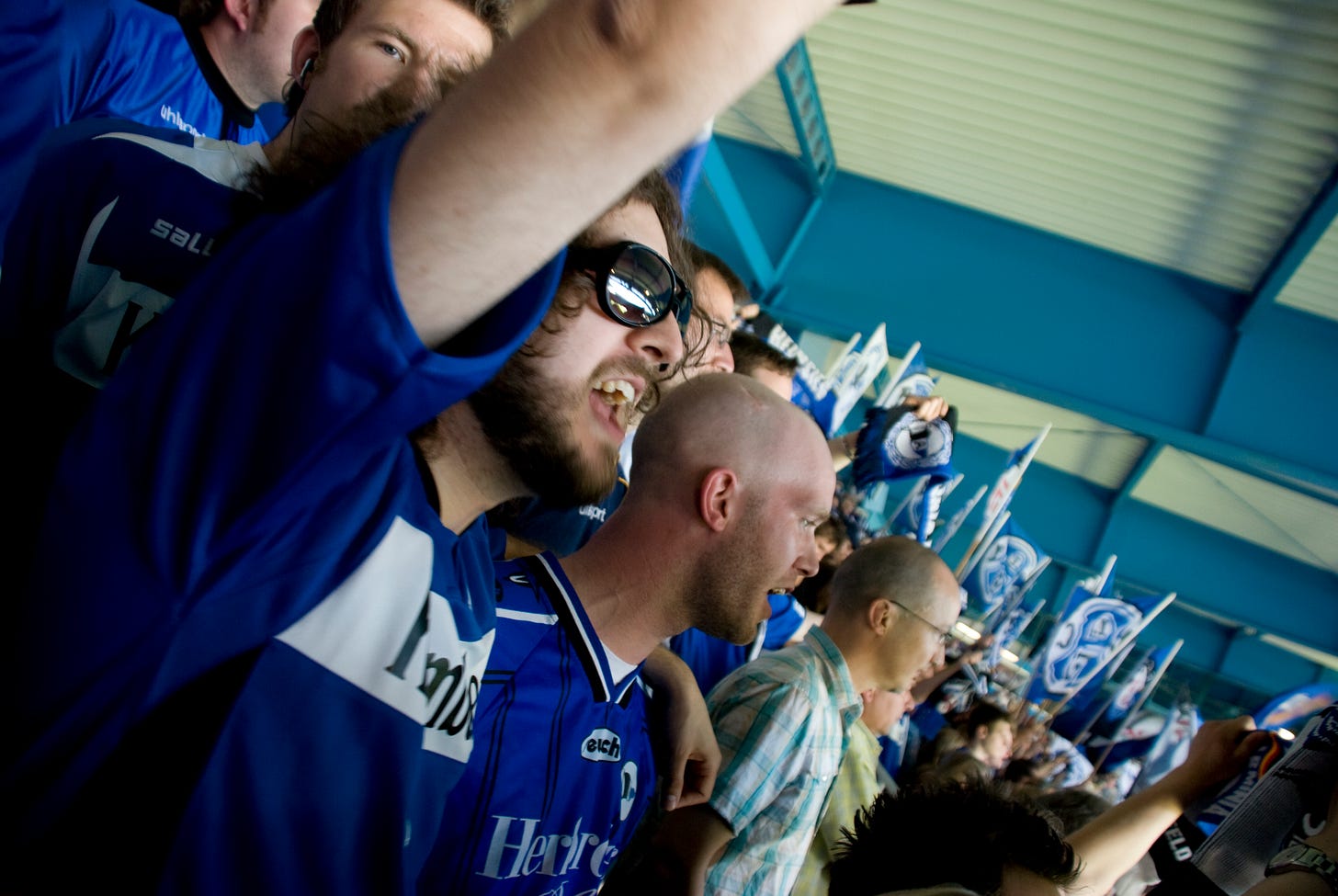
A couple of years ago, the club ran a campaign with the slogan Leiden schafft Leidenschaft – suffering creates passion. Very ostwestfälisch. Very us. There’s even a word for the Bielefeld mindset:
Leidensfähigkeit. The capacity to endure.
There’s something fundamentally masochistic about being a football fan. You go into every match knowing full well you’ll be disappointed most of the time. Like, statistically. You hitch your emotional wellbeing to the form curve of a squad of strangers you feel oddly protective over. You develop a one-sided, unstable relationship with eleven men in polyester. Parasocial.
You’re constantly negged by the whims of a club that at times felt like it was managed by the Joker. And still – that one game, that one glorious, everything-clicks, limbs-everywhere game? Makes it all worth it.
Leidensfähigkeit.
Or as LinkedIn would put it nowadays: Resilience. You want in on the resilience trend? Support Arminia.
Thank you for coming to my TED Talk.
What I’m trying to say is: you don’t just happen to become a Bielefeld fan, like you happen to be a Bayern or Dortmund fan. Arminia is a choice. And once you made it, that’s it. You're in. For better or worse. Mostly worse. But still.
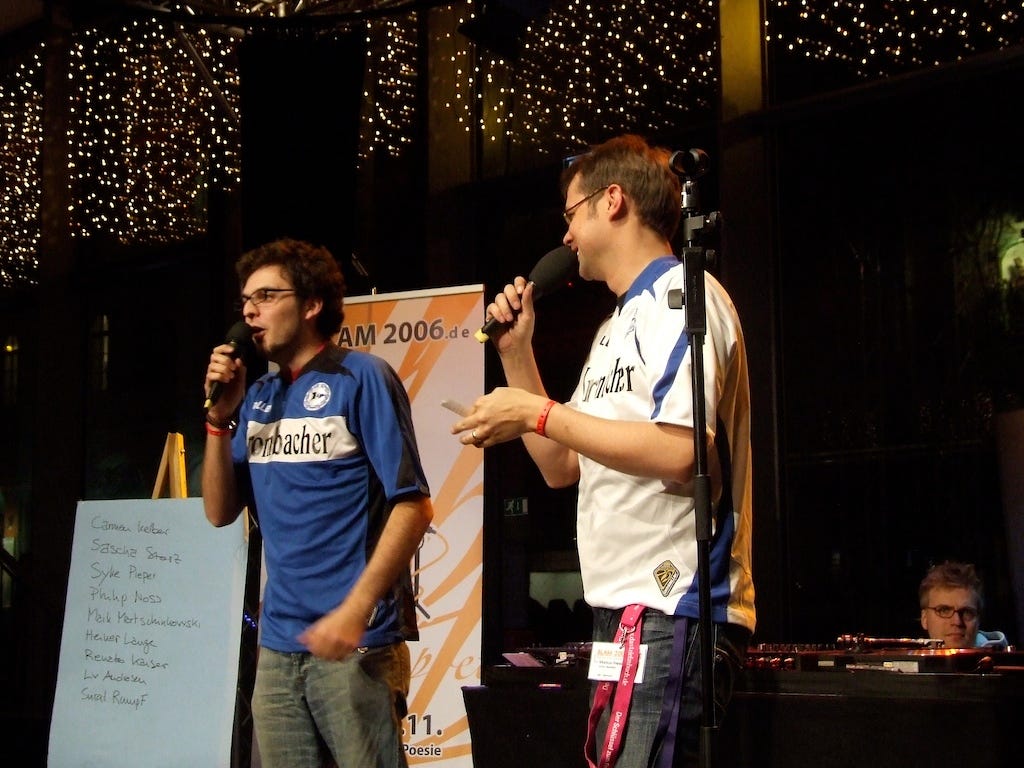
I chose this club over thirty years ago when I stumbled upon it. And as the song goes: Thirty years of hurt / never stopped me dreaming.
And now it’s paid off.
Because this year – finally – we made it to the DFB-Pokal final.
That one game, that one glorious, everything-clicks, limbs-everywhere game that makes it all worth it.
The thing we all used to whisper about, half-joking, half-serious. The thing I dreamt of back in my Kinderzimmer, glued to Uli Zwetz on the radio. The thing I dreamt of, seething and hoarse on the Alm.2
We’ve been to the semi-finals a couple of times. But reaching the DFB-Pokal final seemed impossible.
Until now.
Now this dream has become reality.
From the rock of Gibraltar to rock bottom in Bielefeld to the Olympiastadion in Berlin, a new all-time high, via a dodgy sticker album, a hooligan photo, and one very committed radio announcer.
Honestly, it could’ve been worse. I could’ve ended up a Fürth fan.
Every fan has their origin story. This was mine. What is yours?
Many years later, I would get to interview the man himself, Dr. Uli Zwetz, for the Arminia Supporters Club magazine (read the interview here).
DFB-Pokal win and Oasis reunion in the same year? Too good to be true? Possibly. Who knows.



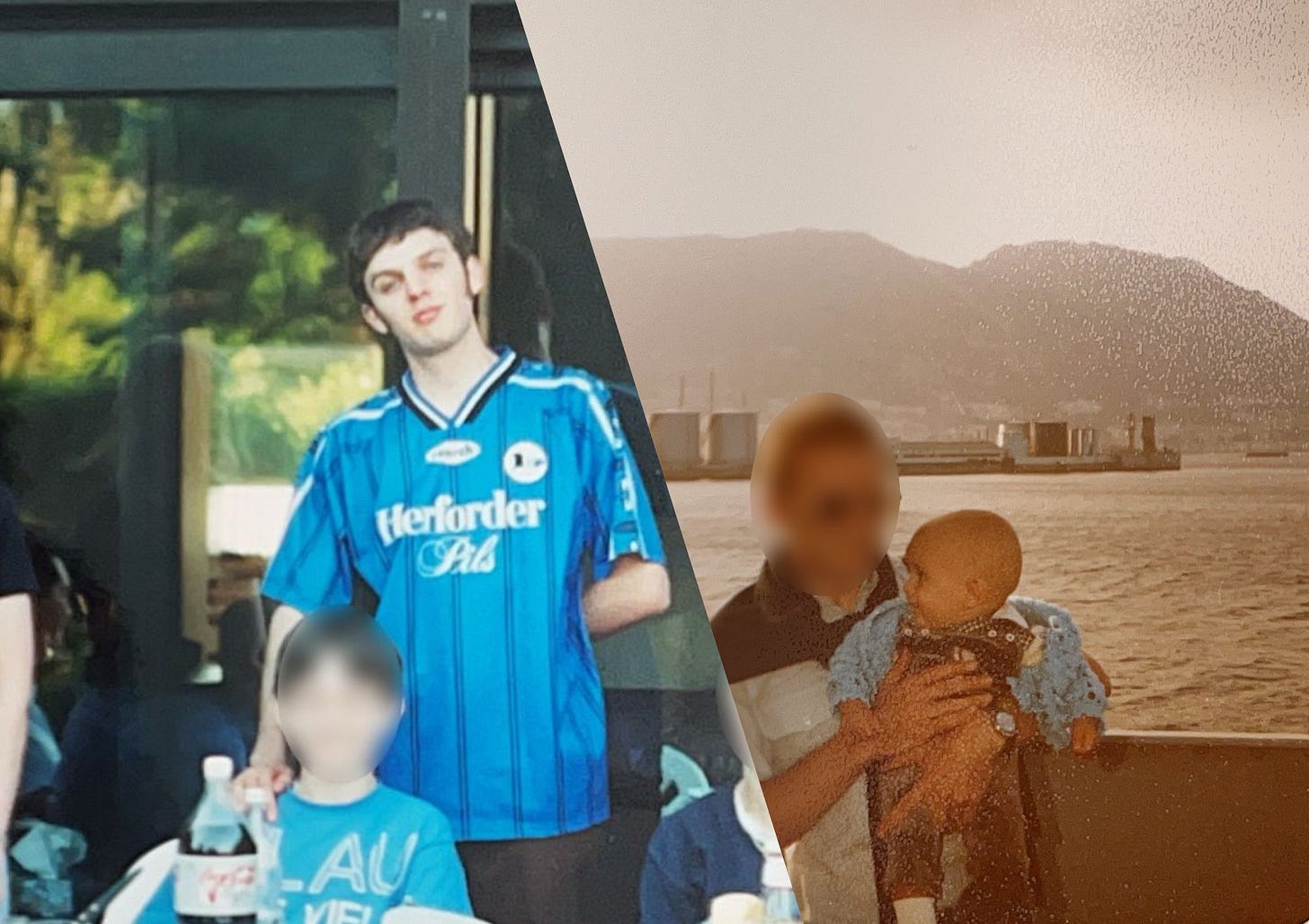
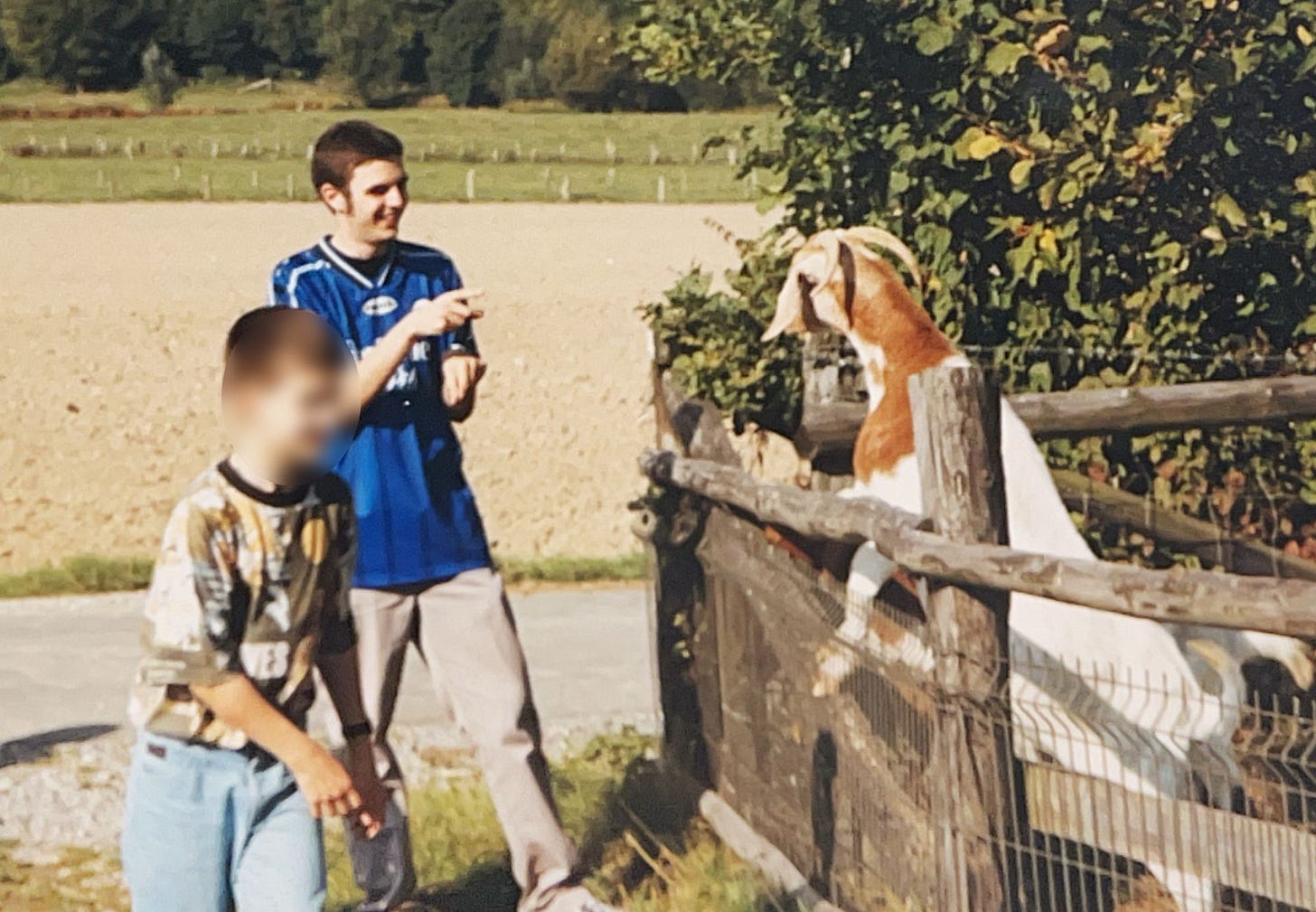
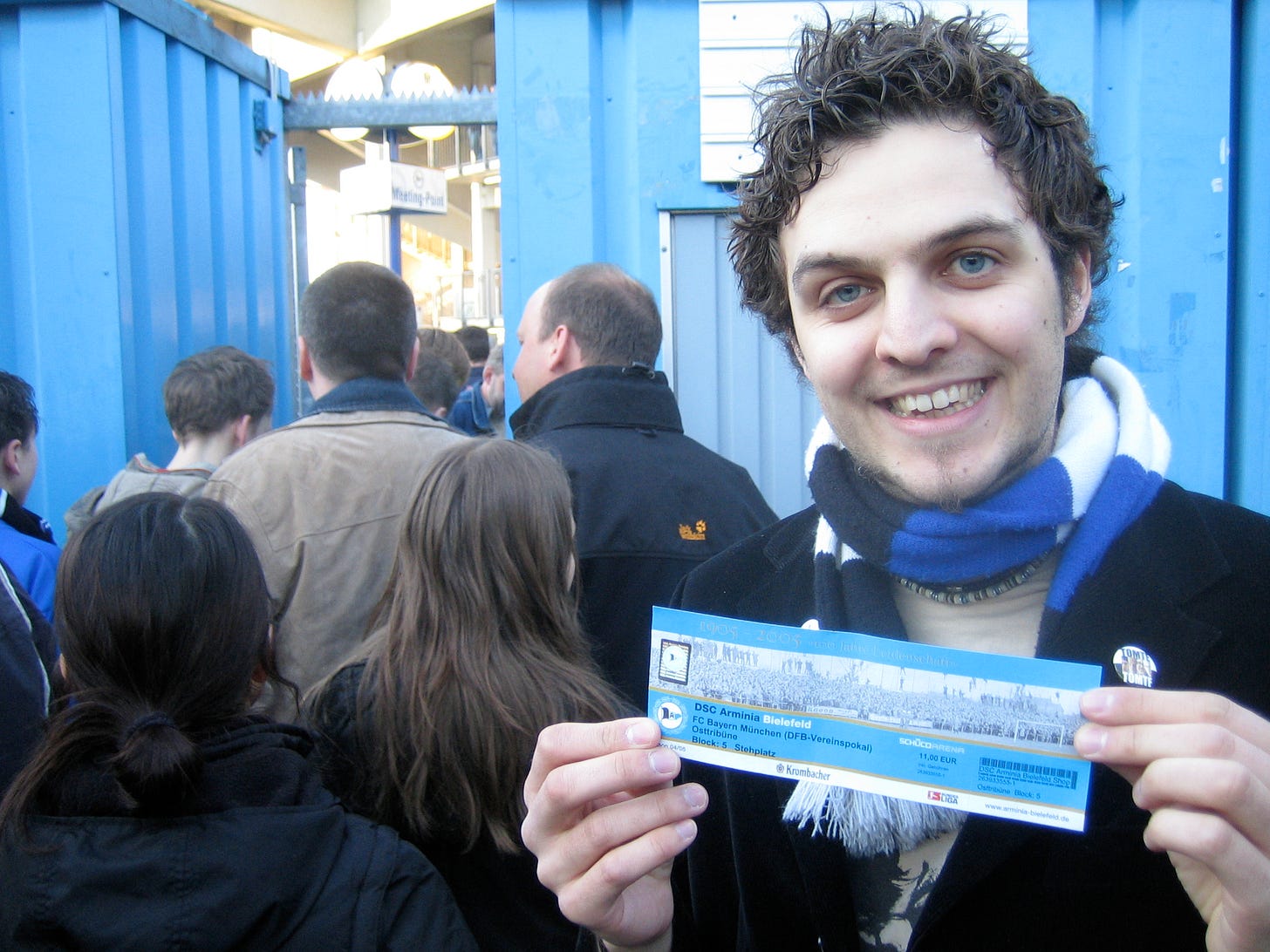
hier bevor eine million klicks